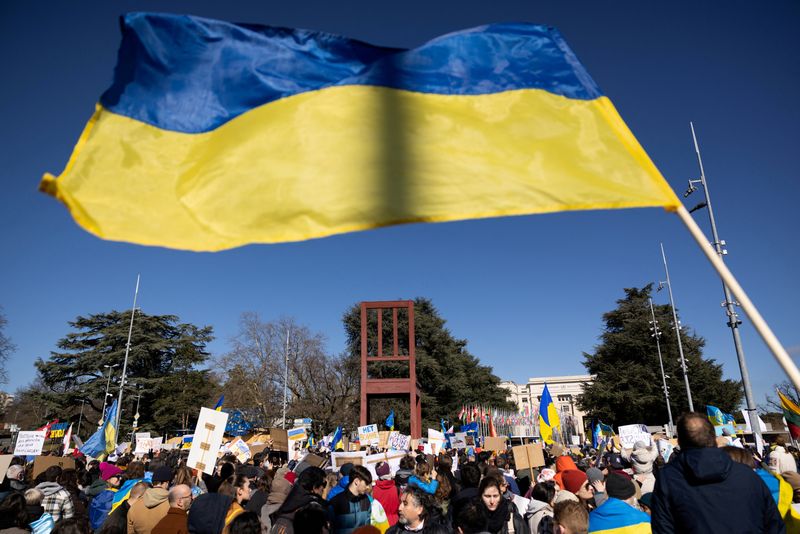By Dave Graham
ZURICH (Reuters) - An upcoming Ukraine peace summit, ostensibly the most ambitious bid in years by neutral Switzerland to mediate a major conflict, is instead showing how Swiss economic and security interests increasingly align with Western Europe over Russia.
This is the view of both Swiss advocates of closer cooperation with Western powers and nationalist opponents who say Switzerland is abandoning its neutral tradition and should limit the scope for foreign entanglements.
Russia has not been invited to the June 15-16 talks taking place at a lakeside resort near the central city of Lucerne, which Switzerland agreed in January to host at the behest of Ukrainian President Volodymyr Zelenskiy.
Rather than ending the war, the summit is poised to work towards mitigating risks stemming from Moscow's invasion of Ukraine and trying to isolate Russia, according to Western diplomats and Swiss foreign policy experts.
"It's going to be about shoring up Ukraine rather than bridge-building for immediate peace," said Daniel Woker, a former Swiss ambassador to Australia, Singapore and Kuwait.
Responding to a request by Reuters for comment, the Swiss foreign ministry said Switzerland's neutrality is "constant" and will not be altered by the conference.
"But being neutral does not mean being indifferent," it added in the statement. "Switzerland strongly condemns Russia's aggression against Ukraine. Outside the military realm, the right to neutrality does not stand in the way of solidarity and support for Ukraine and its people."
The conference, which Switzerland says should pave the way for a "future peace process", will focus on issues of global concern such as nuclear safety, freedom of navigation, food security and humanitarian matters, the ministry said.
Switzerland says Russia must be involved in the process, but justified its lack of an invitation next month on the grounds Moscow had repeatedly said it had no interest in taking part.
The Kremlin has described Switzerland as "openly hostile" and unfit to mediate in peace-building efforts, in particular because of its adoption of EU sanctions against Moscow.
Bern has asked over 160 delegations to the summit, pressing hard to include to Russian allies from the so-called Global South, notably China, which says it is considering taking part.
If the summit can craft consensus with Russian allies on areas of mutual concern it could increase pressure on Moscow to compromise, diplomats say.
European support for the summit is solidifying, with German Chancellor Olaf Scholz confirming his attendance, alongside leaders from Spain, Poland and Finland, among others.
NEUTRALITY
Thomas Borer, a former Swiss ambassador to Germany, said Switzerland's business and security interests are overwhelmingly tied to Western Europe, North America and their allies, making it strategically imperative to stand with Ukraine.
Government protestations of neutrality would not change that, he added.
"Neither the Russians nor our Western allies view us as neutral," he said.
Around two-thirds of Swiss exports go to North America, the EU, Britain, Japan and Australia. Less than 1% go to Russia.
Supporters of closer Western alignment also note Switzerland is almost completely surrounded by NATO countries, which act as a buffer against potential external intrusions.
"Neutrality is a cop-out for a country that's basically getting a free ride off the security that others provide," said Franziska Roth, a lawmaker in the Swiss parliament for the center-left Social Democrats.
Since Russia invaded Ukraine, two of Europe's other historically neutral states, Sweden and Finland, have both joined NATO.
As a U.N. member, Switzerland had a duty to uphold international law, which the Russian invasion violated, Roth said. Helping Ukraine recover from that took precedence over outdated notions of neutrality, she added.
Neutrality is, however, firmly rooted in the Swiss psyche and ditching it would be akin to Britain abolishing the monarchy, regardless of the geopolitical forces pulling at the country, said former ambassador Woker.
A study published in March by the Center for Security Studies at the ETH Zurich showed 91% of Swiss felt the country should stay neutral, though 26% also backed taking "a clear stand" in favour of one side in foreign military conflicts, up 8 percentage points from 2021.
It also showed a majority in favor of Switzerland getting closer to NATO.
Woker and other critics argue neutrality is an anachronism used as a pretext for protecting Swiss economic and financial interests, and risks isolating the country.
Recognized in 1815 by European powers after Napoleon's defeat and enshrined in the 1907 Hague Convention, Swiss neutrality helped bind together the multilingual confederation during the World Wars.
The right-wing Swiss Peoples' Party (SVP), the biggest group in the Swiss lower house of parliament, argues neutrality is an integral part of Switzerland's prosperity and that Bern's support for Ukraine undermines it.
The SVP has initiated a referendum to embed neutrality in the constitution, though it is unlikely to be held before 2025.

The party's most emblematic figure, Christoph Blocher, this month criticized the peace summit, saying failure to invite Russia did not augur well for Switzerland.
"We're only bringing the Ukrainians," he said. "And we say we're neutral."